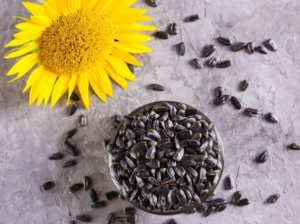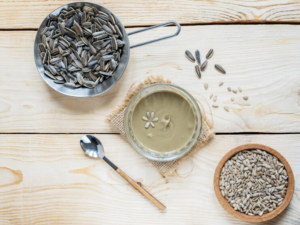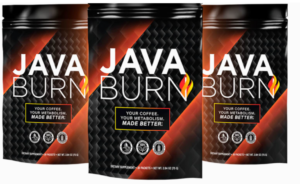Sunflower seeds are more than just a convenient snack; they’re a powerhouse of nutrition that can help you achieve your weight loss and health goals. Packed with essential nutrients, these tiny seeds have garnered attention for their ability to enhance overall wellness and provide a sustainable path to weight management.
Table of Contents
What Are Sunflower Seeds?

Sunflower seeds come from the sunflower plant (Helianthus annuus), prized for its vibrant blooms and versatile seeds. The seeds are encased in a black-and-white striped shell, though they’re most commonly consumed without the shell. Available in raw, roasted, salted, or unsalted forms, sunflower seeds cater to a wide range of tastes and dietary needs.
Nutritional Benefits of Sunflower Seeds
Sunflower seeds are dense with nutrients, offering:
- Healthy Fats: Predominantly unsaturated fats, which promote heart health.
- Protein: Around 5.5 grams per ounce, aiding muscle repair and satiety.
- Fiber: Contributing to better digestion and prolonged fullness.
- Micronutrients: Rich in vitamin E, magnesium, selenium, and folate.
Weight Loss Benefits of Sunflower Seeds
Sunflower seeds can play a significant role in weight loss due to:
- Satiety: High fiber and protein content reduce hunger, curbing unnecessary snacking.
- Metabolism Support: Magnesium in sunflower seeds helps regulate blood sugar levels and energy production.
- Low Glycemic Index: A slow release of energy prevents blood sugar spikes, reducing fat storage.
Key Nutrients in Sunflower Seeds
- Vitamin E: A powerful antioxidant that enhances skin health by protecting cells from damage.
- Magnesium: Aids in the production of energy while enhancing muscle and nerve function.
- Phytosterols: Compounds found in plants that lower bad cholesterol.
How Sunflower Seeds Boost Overall Nutrition
Beyond weight loss, sunflower seeds are excellent for:
- Heart Health: Reducing LDL cholesterol and improving lipid profiles.
- Digestive Health: Their fiber content promotes regular bowel movements.
- Immune Function: Selenium boosts the body’s defense mechanisms.
Different Ways to Use Sunflower Seeds
Sunflower seeds are incredibly versatile:
- As Snacks: The crunchy texture of roasted seeds makes them a satisfying snack.
- In Smoothies: Blend them for a creamy texture and nutritional boost.
- In Meals: Sprinkle over salads, oatmeal, or yogurt for added crunch and flavor.

Incorporating Sunflower Seeds into a Weight Loss Diet
To maximize benefits, follow these tips:
- Portion Control: Stick to a serving size of 1 ounce to avoid excess calorie intake.
- Balance: Pair sunflower seeds with fresh vegetables or lean protein for a complete meal.
- Timing: Consume seeds as a pre- or post-workout snack to fuel or recover efficiently.
Sunflower Seeds vs. Other Seeds
When compared to chia, flax, and pumpkin seeds, sunflower seeds hold their own:
- Chia Seeds: Higher in omega-3s but lower in vitamin E.
- Flax Seeds: Excellent for omega-3s, yet sunflower seeds are richer in magnesium.
- Pumpkin Seeds: More zinc, but sunflower seeds offer better vitamin E content.
Common Myths about Sunflower Seeds
- Myth: Sunflower seeds are fattening.
- Truth: When consumed in moderation, their healthy fats actually aid weight management.
- Myth: Roasted seeds lose all nutrients.
- Truth: While some nutrients may diminish, most remain intact.
How to Buy and Store Sunflower Seeds
- Buying: Opt for unsalted, raw seeds for maximum health benefits.
- Storage: Rancidity can be prevented by storing them in an airtight container in a cool, dry environment.
Potential Side Effects and Precautions
While generally safe, sunflower seeds may:
- Trigger allergies in some individuals.
- Cause weight gain if consumed in large quantities due to their calorie density.
Sunflower Seeds for Specific Diets
Sunflower seeds are a versatile addition to several dietary plans, accommodating various lifestyles and nutritional needs:
1. Keto Diet
Sunflower seeds are an ideal fit for a ketogenic way of life since they’re high in solid fats and low in carbohydrates. Incorporating these seeds into meals or snacks ensures you stay in ketosis while reaping the benefits of essential nutrients like magnesium and vitamin E.

2. Vegan Diet
For vegans, sunflower seeds offer plant-based protein and essential fatty acids that are often challenging to obtain from a purely plant-based diet. They’re also a great source of B vitamins, crucial for energy metabolism.
3. Gluten-Free Diet
Being naturally gluten-free, sunflower seeds are safe for individuals with celiac disease or gluten sensitivity. They can be used in homemade gluten-free bread or granola.
4. Mediterranean Diet
Sunflower seeds adjust well to the Mediterranean eating routine’s accentuation on nuts and seeds. They provide the unsaturated fats and antioxidants vital for heart health.
5. Low-Sodium Diet
If you’re on a low-sodium diet, opt for unsalted sunflower seeds to enjoy their benefits without compromising your sodium intake.
Creative Recipes Featuring Sunflower Seeds
Adding sunflower seeds to your eating regimen doesn’t need to exhaust. Take a look at these creative ways to enjoy them:
1. Sunflower Seed Butter
Swap traditional peanut butter with sunflower seed butter for a nut-free alternative that’s just as creamy and nutritious. Spread it on toast or use it as a dip for fruits and veggies.
2. Sunflower Seed Pesto
Replace pine nuts with sunflower seeds in your pesto recipe. Blend them with fresh basil, garlic, olive oil, and Parmesan for a flavorful sauce.
3. Energy Bites
Combine sunflower seeds, oats, honey, and dried fruits to create no-bake energy bites. They’re perfect for a pre-workout snack.
4. Crunchy Topping
Sprinkle roasted sunflower seeds on soups, stir-fries, or baked goods for added crunch and nutrition.
5. Smoothie Boost
Add a tablespoon of sunflower seeds to your morning smoothie for extra fiber and protein.
Sustainability and Environmental Impact
Sunflower seeds are not only good for your health but also have a relatively low environmental footprint compared to other sources of protein. The sunflower plant is highly efficient in its use of water and can thrive in a variety of climates, making it a sustainable crop.
Additionally, sunflower seed farming supports biodiversity. Many farmers grow sunflowers as part of crop rotation strategies to enrich the soil and promote healthier agricultural ecosystems.
Inspiring Success Stories
Real-life experiences often inspire us to make positive changes. Here are a few cases where incorporating sunflower seeds led to tangible health benefits:
1. Weight Loss Transformation

A study participant in a weight management program reported a significant reduction in unhealthy snacking by replacing chips with a handful of sunflower seeds. The high protein content helped curb cravings, leading to a steady weight loss over six months.
2. Improved Energy Levels
Athletes who added sunflower seeds to their post-workout meals noticed better recovery and sustained energy throughout the day. Magnesium played a crucial role in muscle relaxation and energy production.
3. Lower Cholesterol Levels
A 45-year-old participant with high cholesterol incorporated sunflower seeds into their daily diet. Over a period of three months, their LDL cholesterol dropped by 15%, attributed to the phytosterols in the seeds.
Encouraging Moderation and Awareness
While sunflower seeds are nutrient-dense, moderation is key. Overeating them can lead to unintended consequences like weight gain due to their calorie density. Aim for 1–2 ounces per day, and consider pairing them with fresh produce to create balanced meals.
Also, pay attention to added ingredients. Some commercial varieties of sunflower seeds come coated with salt, sugar, or artificial flavorings, which can negate their health benefits. Always check the label and choose minimally processed options.
Case Studies and Scientific Evidence
Studies have shown that incorporating sunflower seeds into a balanced diet can:
- Improve lipid profiles, as noted in a 2012 study on dietary phytosterols.
- Aid weight loss by reducing hunger and enhancing metabolic function.
Taking Action: Start Today!
Incorporating sunflower seeds into your diet is a simple yet effective step towards better nutrition and weight management. Whether you enjoy them as a snack, mix them into recipes, or use them as a topping, the benefits are undeniable. Begin with small changes—replace unhealthy snacks with a handful of sunflower seeds or try one of the creative recipes shared above.
Make these tiny nutritional powerhouses a part of your daily routine and experience the transformation in your health and well-being.
Conclusion
Sunflower seeds are a nutritional powerhouse that can aid in weight loss and enhance overall health. By incorporating them into your diet mindfully, you can enjoy their numerous benefits while staying on track with your health goals.
FAQ’s
Yes, they’re high in fiber and protein, helping control appetite.
Consume them raw, roasted, or as a topping for meals.
The low carb and high fat content makes them a great choice.
Excessive intake may lead to weight gain or allergies in some.
Some nutrients may diminish during roasting, but most are retained.
Stick to about 1 ounce per day for optimal benefits.
Yes, they contain phytosterols that reduce LDL cholesterol.
Yes, but ensure they’re unsalted and offered in moderation.
Yes, as long as you maintain portion control.
Unshelled seeds are ready to eat, while shelled seeds require cracking.

10 Proven Benefits of Bananas for Health and Well-being
Bananas are known for their natural sweetness, ease of peeling and rich nutrition. This makes them one of the most commonly consumed fruits in the world. Though bananas originated in Southeast Asia, they are now

Disease X: The Next Pandemic?
Emerging infectious diseases pose one of the greatest threats to human health and global stability. One of them, “Disease X” has intrigued scientists and WHO, as it represents the potential for an unknown disease to

The Remarkable Benefits of Eating Acorn Squash in Winter
Acorn squash has all the qualities that make it special. Winter calls for warmth, comfort, and nutrition, and acorn squash provides all of these. This vegetable is not just delicious but also has a lot

Omega-3 Fatty Acids
Omega-3 fatty acids play a very important role in the nutrients needed to maintain overall health. As people are getting to know about it, its popularity is increasing day-by-day. These fats play a very important



